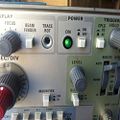442: Difference between revisions
Jump to navigation
Jump to search
No edit summary |
No edit summary |
||
| Line 12: | Line 12: | ||
except for the dual-JFETs that are used as high-impedance buffers at the signal inputs. | except for the dual-JFETs that are used as high-impedance buffers at the signal inputs. | ||
The anode voltage on the CRT is 10kV and the standard phosphor was P31. | |||
A Tektronix 442 consumes 36 watts and weighs about 20 pounds. | |||
* [http://w140.com/tek_442_operators.pdf Tektronix 442 Operators Manual (PDF)] | * [http://w140.com/tek_442_operators.pdf Tektronix 442 Operators Manual (PDF)] | ||
* [http://w140.com/tek_442_service.pdf Tektronix 442 Service Manual (PDF)] | * [http://w140.com/tek_442_service.pdf Tektronix 442 Service Manual (PDF)] | ||
Revision as of 12:53, 1 October 2011
The Tektronix 442 is a 35MHz dual-trace oscilloscope with a single timebase.
Serials numbers from B010100 to B010786 use the 154-0729-00 CRT. Starting with serial number B010787, the 154-0804-00 CRT is used.
Triggering is done using a trigger amplifier made of discrete bipolar transistors and a 74S00 TTL quad NAND gate configured as a flip-flop.
The power supply is linear and regulated using opamps as error amplifiers.
The vertical and horizontal amplifiers are made of discrete bipolar transistors except for the dual-JFETs that are used as high-impedance buffers at the signal inputs.
The anode voltage on the CRT is 10kV and the standard phosphor was P31.
A Tektronix 442 consumes 36 watts and weighs about 20 pounds.

